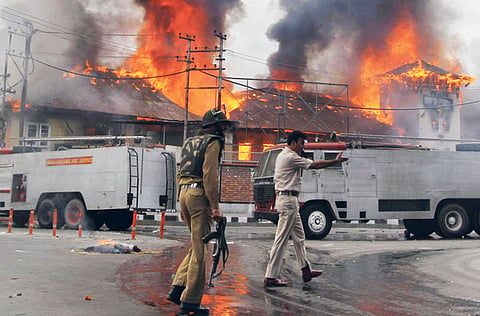A perplexed leader can't help Kashmir
Omar Abdullah can ill afford to be fazed by the enormity of the challenge

Timing is an important factor for politicians. They should know when to speak. If they do not know what should be said and when, they can land themselves in trouble.
India's first Governor General C. Rajagopalachari was correct in supporting the demand for Pakistan in 1942. But since he was a tall leader of the Congress, which was opposed to the demand at that time, he was not only vehemently criticised but also made to feel like a persona non-grata in the party.
Similarly, Jammu and Kashmir chief minister Omar Abdullah's outburst in the state legislature came at the wrong time. His statement that the state acceded to India in 1948, without merging with the country, is correct factually and historically.
His grandfather Shaikh Abdullah, then the state's prime minister, joined the Union on the condition that New Delhi's sway would be limited to three areas — defence, foreign affairs and communications — with the state deciding on other issues. New Delhi accepted the condition.
Omar Abdullah's enunciation of historical facts came at the wrong time. He should have considered the political atmosphere in the state and a rising public cry for freedom. His drawing the line between accession and merger at such a time was bound to be misunderstood. The pro-freedom protesters have interpreted it as a question mark over India's claim that Kashmir is an integral part of the country. Hardliner Syed Shah Gillani has already asserted that Omar Abdullah is "speaking" his language."
On the other hand, Omar Abdullah has diluted his credentials in India. Even the Congress party observed that his statement in the state assembly is at variance from the affirmation not long ago in the Lok Sabha that he was an Indian — to applause across the country.
Scapegoat
It is understandable that he was under pressure when he made the statement in the assembly. More than 100 people had died in clashes between stone-pelting protesters and security forces at the time. But the forbearance and stamina of a person is tested during stressful situations. As the chief minister, he cannot pass the buck. He seems to be making the federal government a scapegoat for his troubles. He has to be circumspect in what he says and does. I feel Omar Abdullah lacks maturity, not integrity.
The chief minister's statement that he is "not a puppet" is another sad commentary on the Indian federal structure. It means that the federal government flexes its muscles whenever it wants to make the states fall in line. The statement also shows Omar Abdullah in poor light: why should he give the impression to New Delhi that he is malleable? One has not heard the remark of being "a puppet" from other chief ministers. There must have been something to make him say this.
What is the status of Kashmir when the state has signed the instrument of accession and has not merged can be debated by people who have not taken oath under the Indian constitution. When Omar Abdullah assumed office, he swore by the constitution which says that Kashmir is an integral part of India. True, there is a special status given to Kashmir (Article 370) within India, not outside the Union.
Shaikh Abdullah paid the price of transgressing that thin line and was detained for 12 years despite being Jawaharlal Nehru's best friend. He returned to power only after pledging allegiance to the Indian constitution and ruled the state as long as he lived.
Storm in a tea cup
I do not think that things would come to such a pass again because New Delhi has learnt not to be too sensitive. And I do not see Omar Abdullah becoming a rallying point for the protesters asking for freedom. The whole thing may turn out to be nothing more than a storm in a tea cup. Except for the Bharatiya Janata Party (BJP), no other political party has made Omar Abdullah's remarks an issue.
This does not, however, mean that New Delhi's encroachment on the power which belongs to the state is justified. Acts which have been passed in areas other than the defence, foreign affairs and communications domains have to be withdrawn.
It is welcome to note that Omar Abdullah said that Pakistan must be associated with any solution to the Kashmir issue. India has itself said many a time, from the Tashkent declaration to the Shimla agreement, that Kashmir remained to be solved. Therefore, no solution can be lasting without Islamabad's agreement.
It is a coincidence but an interview of former Pakistan president Pervez Musharraf by television journalist Barkha Dutt has brought to the fore the Kashmir solution which both Pakistan and India had found acceptable. It only had to be inked. The formula is reportedly still acceptable to India but not to the Asif Zardari government in Pakistan. New Delhi has to pursue the formula vigorously.
What surprises me is that the Kashmiris have not yet realised, after sacrificing thousands of their men, that India would never accept a position where the state opts for a status outside the country. New Delhi may be willing to go beyond the Indian constitution but not the Indian Union.
Kuldip Nayar is a former Indian High Commissioner to the United Kingdom and a former Rajya Sabha member.


